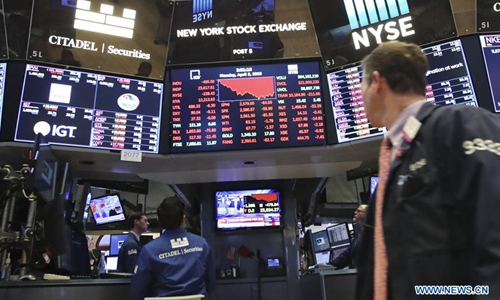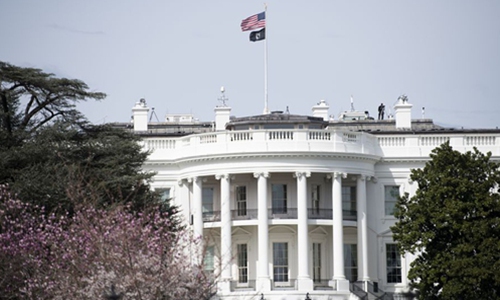HOME >> SOURCE
US financial hegemony makes world pay for its losses to COVID-19
By Wang Cong Source:Global Times Published: 2020/3/19 23:58:41 Last Updated: 2020/3/21 0:49:01
High time to seek a fairer alternative to dollar system: analysts

File photo: Xinhua
After failing to contain the coronavirus epidemic and save its financial markets, the US government is now preparing for drastic measures, including a trillion-dollar stimulus package, to save the US economy. But that will come at the expense of China and even the broader global community because of the US' financial hegemony, Chinese analysts said on Thursday.
This is just the latest example of how global overreliance on the US currency poses serious risks for the rest of the world and the dire need to form a more reliable and fairer alternative, particularly given Washington's frequent abuse of power in everything from trade wars to geopolitical disputes, the analysts noted.
World paying for US losses
As warning signs continue to flash that the US economy could plunge into a depression, the US government has proposed a $1 trillion rescue plan, including direct checks of $1,000 or more for all US adults, $300 billion for small businesses, $200 billion for the airline industry and other sectors, according to US media reports.
The plan, which is still being negotiated at Congress, is just part of a broader bailout program that is over $2 trillion and counting, which could be unprecedented in both size and velocity, greater than even the $800 billion plan during the financial crisis, the Washington Post reported on Thursday.
While the plan is necessary for the US economy, which some estimate could see a 14 percent contraction in the second quarter and a 20 percent unemployment rate, there is one problem, as many have noted: Who's going to foot the bill?
Through one way or another, a big chunk of the tab will be picked up by the international community, including China, though a specific amount is hard to calculate, analysts said.
"The cash the US government will send to its citizens will also be paid by people from around the world," Yang Delong, chief economist at the Shenzhen-based First Seafront Fund Management Co, said in a research note sent to the Global Times on Thursday.
To bailout its faltering economy, the US will need to print a lot of cash, which will drive down the value of the dollar, the biggest reserve currency, and that means massive shrinkages in other countries holding US currency, Yang explained.
"All the countries that have US currency holdings are indirectly giving away free cash to US citizens. In other words, the US is being generous at others' expense," he said.
The US dollar remains the world's largest reserve currency, accounting for 63 percent of global foreign exchange (forex) reserves, because many countries need US currency for cross-border trade and commodity transactions, according to a report from Ren Zeping, chief economist for the Guangzhou-based Evergrande Group on Thursday. The Chinese mainland has a whopping $3.1 trillion in forex reserve and Japan has $1.2 trillion, compared to the US' mere $44 billion, the report noted.
"To put it simply, the US has directly shifted losses stemming from the epidemic and financial market for the world to pay, with China picking up the largest share. This is very irresponsible," Ren said in the report that was shared with the Global Times.
To rescue its economy, the US government could also raise its massive debt of roughly $21 trillion, of which about $6 trillion is held by foreign countries such as Japan and China. With the US Treasury yield, the US is also basically using foreign money to boost its economy at a minimum cost, analysts pointed out.
More damage could be felt by other countries, especially emerging markets, even after the crisis is over, due to repricing of financial and other assets and change in capital flows due to fluctuations in the dollar's value, according to analysts.

The White House Photo: Xinhua
Seeking an alternativeThis is another wakeup call for the international community to find a more reliable and fairer alternative to the dollar-dominant system and counter the US' financial hegemony, said Cao Heping, an economist at Peking University.
"What the US is doing now is standard measures in time of economic crisis and the US economy is in a crisis, but the problem is the overreliance on the US dollar," Cao told the Global Times on Thursday. "We have been saying this for a long time but this epidemic proves once again we need a global trade system based on a basket of multiple currencies rather than just the US dollar."
Among other things, the dollar-centric system was initially accepted by countries around the world based on relatively sound US economy and the US government's reliability. However, economic crises and frequent abuses of power by the US government in recent years have raised serious questions over the US economy and its credibility.
Under President Donald Trump, the US has often used its financial hegemony in everything from its crackdown on Chinese tech companies such as Huawei to geopolitical gambits in the Middle East, including unilateral sanctions on Iran that have prevented other countries from buying Iranian oil and led some in Europe to set up a payment system that bypasses the US dollar. Also, the US economy has proven to provide instability to the world rather than act as a stabilizer, analysts noted.
"The only thing unchanged is the US' constant mismanagement of its economy," Cao said, pointing to the 2008 global financial crisis, which was caused by troubles in the US, and the US government's inability to stabilize the economy in the early days of this current epidemic.
Even as the coronavirus spread across the world, US officials, including Trump, were downplaying the risks and touted the US economy's strong fundamentals. Now the US has very limited options to mitigate the damage, but the drastic plans that cost US taxpayers as well as the world much, analysts noted.
Even more damaging is the US' fixation on finger pointing rather than helping coordinate global efforts. In 2008, major economies coordinated their plans and all pitched in. China played a leading role in resurrecting the global economy with a massive stimulus plan that kept its factories running and boosted global demand, analysts noted.
During this crisis, countries are all taking matters into their own hands. After experiencing harsh foreign criticism and the effects of unintended consequences of its massive 2008 stimulus plan, China has taken a more measured approach during this crisis with only targeted stimulus.
"The world has no one to blame but the US, specifically [US President Donald Trump]," Cao said, "after all this, there will be a lot of discussion and I hope we will come up with a new system that does not just favor the US, but all.
Posted in: ECONOMY